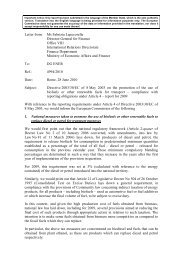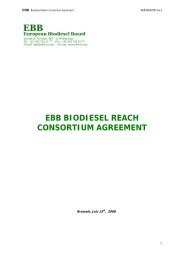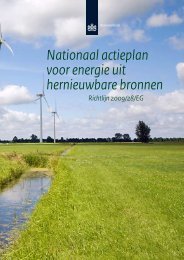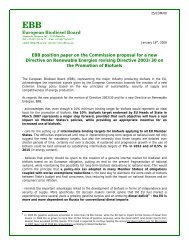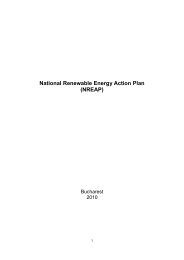EBB - European Biodiesel Board
EBB - European Biodiesel Board
EBB - European Biodiesel Board
You also want an ePaper? Increase the reach of your titles
YUMPU automatically turns print PDFs into web optimized ePapers that Google loves.
445/PRO/07 <strong>EBB</strong> REPLY to public consultation of DG TREN, April-May 2007<br />
As a general principle <strong>EBB</strong> welcomes such a division since we believe that for simplicity reasons the GHG<br />
criterion and land use criteria shall be dealt with, assessed and monitored separately.<br />
Below are the <strong>EBB</strong> comments on the 3 criteria proposed by the Commission (answer 1.1.A) as well as on<br />
the types of evidence required to comply with these criteria (answer 1.1.B):<br />
ANSWER 1.1.A<br />
Sustainability criteria (criteria 1, 2 & 3)<br />
Minimum GHG saving (10%?) (criterion 1)<br />
<strong>EBB</strong> supports the concept proposed by the Commission that biofuels used to fulfil the requirements of the<br />
legislation should not emit more GHG in production than they save. A baseline of 10% would also be<br />
acceptable.<br />
The real problems laying behind a correct implementation of this criterion are two:<br />
1. How are GHG emissions measured?<br />
2. Once measured, with what kind of fossil fuels emissions are biofuels emissions compared?<br />
1. How are GHG emissions measured?<br />
<strong>EBB</strong> believes that an EU wide reference LCA should be identified and agreed by the Commission and by<br />
all the stakeholders as the reference meter for measurement.<br />
The JRC-CONCAWE-EUCAR study can represent a good basis for creating such a reference, but it<br />
needs to be reviewed and ameliorated, as acknowledged by Commission DG Environment during the first<br />
stakeholder consultation meeting on the GHG evaluation schemes under the revision of Directive 98/70<br />
on Fuel Quality held last May, 29 th , 2007.<br />
As already detailed in its title (Concawe is the technical arm of the EU oil industry, EUCAR is the technical<br />
arm of the EU car industry) the JRC-CONCAWE-EUCAR study was performed using unbalanced expertise<br />
and especially no expertise from the biofuels industry and from EU agriculture 5 . This is even worsened by<br />
the presence of a conflict of interests since some Concawe and EUCAR experts work for companies who<br />
are directly developing and strongly supporting some kind of “2 nd generation biofuels” involved in the<br />
study (and this on the specific ground of supposed better GHG balance … ).<br />
As a consequence of this unbalanced expertise, the JRC-CONCAWE-EUCAR study takes a thorough<br />
consideration of all biofuels chains, but surprisingly does not take into consideration biodiesel production<br />
from recycled fats, used frying oils and animal fats waste, whose GHG balance is very positive.<br />
Although the JRC-CONCAWE-EUCAR study is to be ameliorated before becoming an objective reference<br />
agreed by a democratically composed panel of experts, it is still to be kept as a starting point provided it<br />
will be reviewed quickly; the study is reviewed every year: this is a perfect and quick opportunity to<br />
include missing necessary scientific expertise from biofuels industry and agricultural experts.<br />
2. Once measured, with what kind of fossil fuels emissions are biofuels emissions compared?<br />
The JRC-EUCAR-CONCAWE study takes in thorough consideration all biofuels production chains, but takes<br />
into account only one single kind of diesel fuel (as if all fossil fuels where produced from the same crude<br />
oil extraction and in the same production chain). In the study there is no GHG calculation of<br />
unconventional oil extraction (tar sands, heavy crudes etc …).<br />
However, in terms of global CO² emissions, the marginal contribution from biofuels to reduce future oil<br />
demand is likely to have an exponential positive effect on CO² emission reduction. The future marginal oil<br />
demand (which will be reduced by the future marginal increased biofuels use), in fact, will be mainly<br />
satisfied by unconventional oil extraction (both for reasons of price and of security of supply – most of<br />
unconventional oil reserves being in North and Latin America 6 ). Now, CO² emissions from unconventional<br />
5<br />
this leading to a lack of expertise on agricultural laws, yields, pesticides, fertilisers, land use, which is even more curious,<br />
considering that the study focuses mainly on GHG emissions coming from the agricultural aspects and inputs of the biofuels<br />
production chains<br />
6 see table 2 in ANNEX<br />
- 5 -



